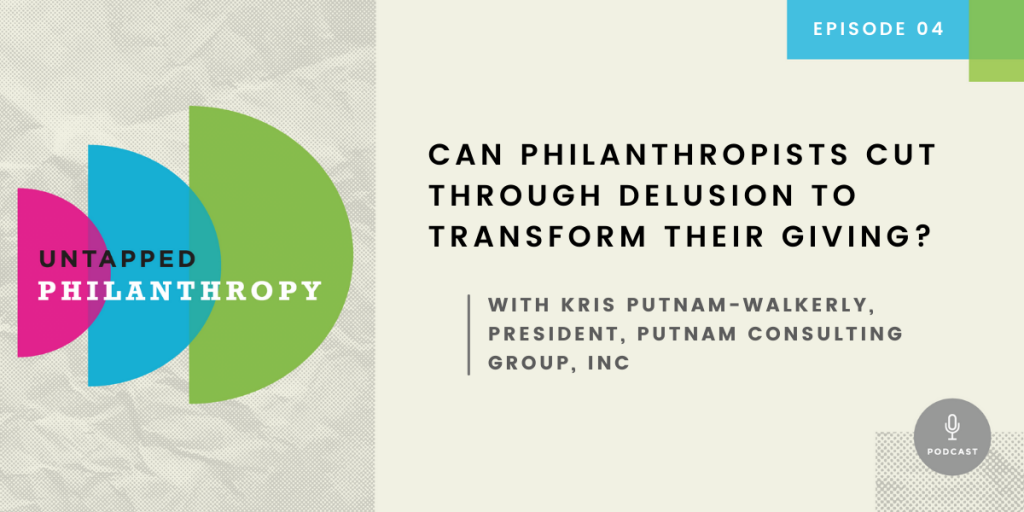Take this short quiz to find out.
It’s philanthropy’s Achilles heel. Foundation leaders, donors, professional athletes, corporate executives—-all philanthropists—-want to be good caretakers of their charitable wealth. They want their assets and profits to grow, so there’s more wealth to give. They also want to reduce their philanthropic costs and save money, so there’s more left to give to the causes they care about.
Seems good, right? Wrong.
In their altruistic effort to be frugal, many donors hold back on investment in essential things like their own talent, strategy development, research, evaluation, technology, relationship building, and even their learning. They hold back investment in their grantees, too. They do this by setting arbitrary limits on how much money can be spent on nonprofit “overhead” or by expecting to see grantees’ results without helping to fund an evaluation. In my latest book, Delusional Altruism: Why Philanthropists Fail To Achieve Change and What They Can Do To Transform Giving, I explore this type of destructive frugality and why it happens to all kinds of philanthropists.
Does this sound like you? Answer the following eight questions to see if your philanthropy suffers from a scarcity mindset:
- Do you frequently ask, “What’s the cheapest way we can do this (regardless of the impact on quality, speed, or your discomfort)?” For example, you’ll take a red-eye flight home to save money on hotel costs, even though it means you are exhausted and unproductive the next day.
- Do you avoid making investments in your talent and infrastructure, or that of your grantees? This might include getting professional development or coaching, upgrading computer systems, attending conferences, evaluating your impact, etc.
- Does your workplace culture value working harder rather than smarter? For example, people feel pressure to work late hours or on weekends, long meetings are the norm, and there are always lengthy processes for strategic planning or budgeting.
- Do you believe that every dollar you raise should go to the people and communities in need? Do you feel guilty investing in yourself or your philanthropic infrastructure and capacity?
- Do you believe the real problems you want to tackle are impossible to solve with your funding? Instead of figuring out how to leverage your funding for outsized impact, do you choose smaller, easier-to-solve problems instead of funding projects that eradicate the symptoms and not the cause?
- When you know something is critical to your endeavor do you feel like you never have the time or resources to obtain it, do it, or fund it? This might include a communications plan, developing partnerships or even taking a much-needed break so you can come back refreshed.
- Do you avoid investing in the people who could help you navigate your philanthropic journey, avoid mistakes, or save time? This could include trusted advisors, professional services (e.g., attorneys, accountants, donor-advised fund sponsors), content experts, consultants, or administrative support professionals.
- Do you and your staff feel you don’t have time to regularly think, plan, or build relationships because you’re always too busy? Do you feel like other priorities constantly take away from these crucial tasks?
How did you do? If you answered “yes” 6–8 times, you need an intervention. A scarcity mindset is holding your philanthropy hostage. You could have a more significant impact, but you thwart yourself at every turn. But don’t panic. Remember, a scarcity mindset is just that—-a mindset. It’s your beliefs. Beliefs can be changed. And just as in Alcoholics Anonymous, the first step is to admit you have a problem.
If you scored 3–5, your scarcity mindset is certainly holding you back, but it’s not strangling you. At least, not yet. Take a good look at the statements to which you answered “no.” If you embrace an abundance mindset for those questions, think about how you can transfer that abundance mindset to all aspects of your giving.
If you answered “yes” to only one or two statements, you are in pretty good shape. But take a hard look at those statements. What’s holding you back? Why do you feel scarcity in those areas? What investments in time or resources could unleash your effectiveness?
Now, if you scored a zero, you’re likely in denial! In my entire professional career, I can only think of one person who genuinely, consistently, and in all aspects of his life could answer “no” to all of these questions.
When philanthropists behave in this way, they hamstring themselves and the nonprofits they support. They genuinely want their philanthropy to change the world, but they’re under a misguided belief that saving leads to impact. They’re delusional about the damage caused by their thrift. Frugality rarely leads to social change. But by recognizing and rectifying this scarcity-mentality weakness, philanthropists can finally start operating with abundance, investing in the necessary human talent and infrastructure to achieve the outcomes the social sector needs.
This article was originally written for and published in Forbes.
Do You Need To Rapidly Refresh Your Strategic Plan?
To navigate and lead during turbulent times, you need a flexible strategy. Your strategy defines what you want to accomplish and how you want to accomplish it. Yet too often, philanthropists lack clarity on both.
Sentient Strategy® is a revolutionary approach to formulate strategy quickly, to be used immediately for as long as conditions warrant, and then to make changes rapidly as conditions change. It builds a simple and flexible strategic approach that creates a road map for change and holds people accountable for rapid implementation.
Kris Putnam-Walkerly is one of only a dozen consultants globally who have been certified by Alan Weiss to deliver Sentient Strategy®.
Navigate the Unknown With Confidence
This free download will help you create a powerful giving plan in radically uncertain times.
So many funders I talk to lately are feeling overwhelmed (and exhausted) because conditions keep changing and it’s hard to plan for an unknown future. But while the future is uncertain, we don’t have to be. You can’t afford to “wait and see.” With these practical how-tos, you can pivot with purpose!
For Your FREE Copy, text the word PLAN2021 to 411321 (outside the US text to +1-909-741-1321) or click below to download.
Are you on Clubhouse?
If your answer is “Yes!” follow me on Clubhouse at joinclubhouse.com/@krisputnam
If your answer is “No” you can sign up by downloading the app on the App Store https://apps.apple.com/us/app/
If your answer is “What is Clubhouse?” it is a new audio-only social-media app and a great opportunity for funders to have authentic, real-time conversations with other social sector leaders! Join me in the Philanthropy and Giving Club on Clubhouse!
Take a Listen to This Episode!
Whether you’re a seasoned donor or just getting started in philanthropy, achieving long-lasting success can only be achieved if you plan ahead.
In this interview with Untapped Philanthropy, I spoke with Fluxx Co-Founder Kerrin Mitchell about the future of philanthropy and how an abundance mindset could change the way we give, collaborate, and work within vulnerable communities.









